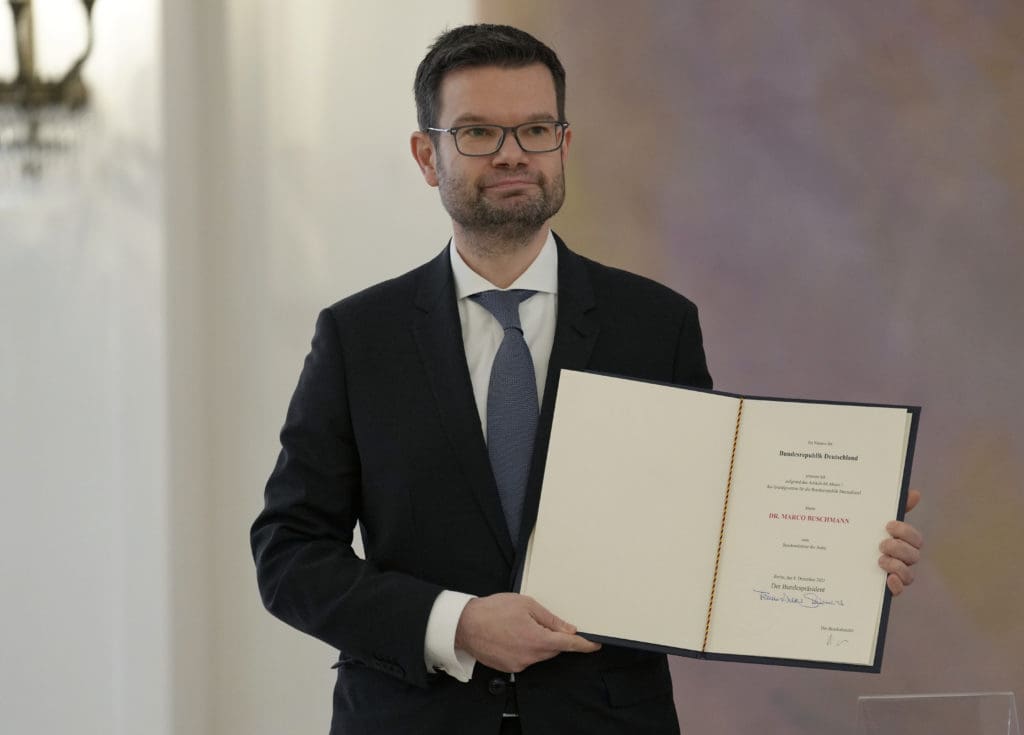Several leading figures in Germany’s new left-liberal coalition government have started advocating for a new EU-wide crusade against the hugely popular encrypted messaging application Telegram, claiming it’s a vector for disinformation and so-called extremist content.
However, aggressive condemnation of the app from Germany’s establishment was not always the case, with the German government-financed media outlet Deutsche Welle praising the fact that the app could not be censored or controlled by the Belarusian government during election fraud protests last year.

Now, censorship of the app in Germany is on the cards. While speaking with the German news organization Tagesschau last month, Federal Justice Minister Marco Buschmann (FDP) claimed that a joint EU-wide crackdown against Telegram would “make a bigger impression” on the tech company than if member states were to take individual measures against the platform.
“What is spread on Telegram is disgusting, indecent, and criminal,” Buschmann began. “My wish is that we do not take a special German path, but rather create a common European legal framework that enables us to take action against hatred and agitation on the Internet.”
Buschmann went on to acknowledge that even if the bloc managed to subdue the messaging application, the problem of disinformation and so-called extremist content circulating on the web would surely persist, since “radicals will find new ways and platforms.”
Germany wasn’t always against Telegram
The government’s harsh rhetoric against the tech platform comes after Germany’s government media outlet Deutsche Welle, praised Telegram during the Belarusian uprising of 2020, referring to the application as the primary tool that was used to organize the opposition. According to a glowing article from Deutsche Welle in support of Telegram:
“What brought them together was their opposition to the rigged presidential election. What connects them since then is the exchange of information via the Telegram Messenger app. The Telegram group — one of dozens across Minsk — is not just about getting the latest political news out. The app makes it possible to organize improvised assemblies in the courtyard, demonstrators help each other here when one of them tries to escape from the police in locked stairwells in Minsk.
These groups are not just about passing on articles and videos: they enable participants to exchange ideas about the future design of the country in which they want to live.”
Other headlines praised Telegram during the protests, with Der Standard writing about the “important role of Telegram in the protests in Belarus, and in a separate article from Deutsche Welle, the outlet wrote that because the media environment in Belarus is so restrictive, only Telegram’s Nexta channel was able to get under-reported information out to protesters. It also wrote that because the app is encrypted, it cannot be censored.
That praise from a German liberal establishment has quickly turned sour as the country’s far-left government sees its own opposition take root on the app as well as those with political opinions outside the mainstream, especially regarding COVID-19 restrictions.
Telegram, now one of the most popular apps in the world, is hardly only used for political purposes. Families share photos, friends start chats, and people form channels around shared interests. However, Germany’s opposition parties, which include the right-leaning Alternative for Germany (AfD), have also organized on the platform. Germans with opinions outside the mainstream are increasingly restricted from traditional social media platforms like Facebook and Twitter, where their content is either banned or highly restricted. Those who are protesting Germany’s planned vaccine mandate and lockdown restrictions have also found a huge platform on Telegram. The left-wing German government views this as a grave threat to their stranglehold on the flow of information and ensuring debate occurs within only a narrow window of opinions.
Extremists have also taken to Telegram, but the Belarusian government’s attempts to shut down Telegram in the country during the protests were also made under the pretext of shutting down extremist content, with Alexander Lukashenko’s government stating that protesters had initiated violent protests and were attempting to overthrow the government.
Germany turns the screws on Telegram
Germany’s justice minister, who assumed the position in December, added that cooperating with the bloc is in Telegram’s interests to have unrestricted access to the European market, noting that the application in November introduced ads as a way to more effectively monetize the platform and create a more sustainable business model.
The justice minister’s words come after high-level officials like Germany’s Federal Interior Minister Nancy Faeser (SPD), Bavarian Prime Minister Markus Söder (CSU), SPD Chairwoman Saskia Esken, Interior Minister of Lower Saxony Boris Pistorius (SPD), and others revealed their intentions to lobby Silicon Valley tech oligarchs to restrict access to the messaging application in Germany.

In November, calls from establishment politicians to ban Telegram intensified after authorities arrested a small group of extremist-militant anti-vaxxers in Dresden for allegedly plotting to murder Minister-President of Saxony Michael Kretschmer (CDU), and using the encrypted messaging application to do so.
In the wake of the police raids, which saw six suspects arrested across several properties throughout the city, an increasing number of German politicians began calling for Telegram to be viewed not just as a messaging service, but also a social media network, that would require the tech platform to comply with stricter rules regarding content moderation.
The co-founder of Telegram, Pavel Durov, has stressed that the app removes all channels that threaten direct violence, but remains an open platform for free expression, writing on his Telegram channel:
“On Telegram, people can publicly express reasonable concerns about vaccines. Large Telegram channels are one of the few remaining places on the Internet where users can raise their voice against various anti-Covid measures, which they feel have restricted their rights.
“What Telegram does not allow, however, is the distribution of calls for violence via public channels. Inciting violence has been prohibited by the Terms of Service of Telegram since 2015, so we take action every time this line is crossed…It’s OK to fight for your rights. It’s not OK to harm other people.”
Beginning this February, German law will require social media platforms to report unlawful content to authorities. Since messaging services are currently exempt from the new law, however, government officials in Germany – including Justice Minister Buschmann – have argued that there should be no place for a “blanket exemption for messengers.”
So far, the Federal Office of Justice has already initiated two proceedings against Telegram for violating the Network Enforcement Act, both of which the Telegram messaging service provided no response to. Subsequently, the interior minister warned that the federal government wouldn’t put up with such insolent behavior from the tech company.
Matthias Kettemann, an expert in internet law and professor at the University of Innsbruck, says there aren’t many political options to regulate Telegram, claiming that an outright ban on the app would be unconstitutional.
“Our solution must not be to block Telegram. We have to force Telegram to moderate better and to delete clearly illegal content more quickly.”






